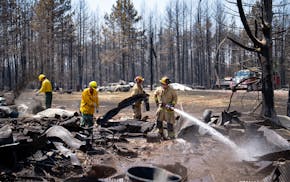Opinion editor's note: Strib Voices publishes a mix of commentary online and in print each day. To contribute, click here.
•••
I'm stepping into this columnist role after closing a 21-year stint as a community college public speaking instructor. I'll likely always think of May as "outline season," the time when students hastily compose their more complex speeches near the end of the semester.
In my former line of work, I would see common themes in the topics students choose to speak about. Before the Boston Red Sox won the World Series in 2004, "the Curse of the Bambino" was a favorite. When the Chicago Cubs won in 2016, another genre of baseball curse speeches met a welcome demise. Sometimes, pop culture trends emerge, like K-pop.
But for every passionate fan of something found on the internet, others use the internet to think for them. This began subtly with search engines years ago, but AI applications like ChatGPT are stripping critical thinking from student work. Adult work, too.
Enter "the Importance of Sleep." In my last semester of teaching, about 1 in 10 students proposed this topic, building on a trend that began several semesters ago.
In some ways, it's the perfect topic. Everyone sleeps. People aren't sleeping enough. Health classes stress the importance of sleep. The night before anxiety-inducing standardized tests, teachers drill students to get a good night's sleep. Thus, many students pick this topic organically, like the low-hanging fruit it is.
But that's exactly why it represents the downside of AI to human intelligence. The most common inputs become the most common outputs. The same technology that connects us with people across the planet forces us into well-worn ruts of information.
For years, search engines created patterns of knowledge that shaped our views and prioritized certain content providers over others. AI amplifies this by magnitudes. In fact, a Google search today will show you summaries of several different sources, rendering independent content producers into a feeder for Google's AI.
I thought COVID-19 changed everything when it comes to education. But compared to what's been happening with artificial intelligence just these last two years, COVID was a blip. I leave the classroom knowing that teaching and learning is about to change forever.
I went to ChatGPT and typed in a very simple two-sentence request to meet the informative speech outline assignment I give students. Naturally, I selected "the Importance of Sleep." The result was revelatory. In two or three seconds, I had a B+ outline with properly cited sources. A few minor revisions and it would easily have become an A. Why wouldn't a student use this?
Here's why they shouldn't. It's a limited version of human thinking, like one of those kitty keyboards in the toy section of Target. Sure, you can play a song. You just can't play chords or multiple octaves. (Also, and perhaps this goes without saying, it meows).
In his introductory remarks, the new Pope Leo XIV spoke on AI.
"In our own day, the church offers everyone the treasury of its social teaching in response to another industrial revolution and to developments in the field of artificial intelligence that pose new challenges for the defense of human dignity, justice and labor."
Without independent thought and free will, humans are little more than consumers. Where would our morality and creativity come from? There's no room for God or humanity in such a world.
Some say we shouldn't worry so much. AI can release us from the bondage of menial tasks, leaving the rest of our time for family, leisure and the pursuit of higher purpose.
To a certain degree, we saw this with industrialization 100 years ago, something the pope alluded to. But it wasn't so easy to get there. The process was neither fair nor flawless.
If I were still teaching, I'd have to retool my classes. More handwritten assignments. More impromptu speeches. When it's time to do research, I'd let students start with AI and then show what it's missing. At this point, there is no way to fully extricate it from human behavior. CEOs and senators are using it to write emails. Students are graduating with degrees boosted by AI help.
We are in the maw of great change. If you're still sleeping on AI, well, I'm glad that you are reaping the "physical health, mental clarity, emotional well-being, and overall productivity of proper rest," as ChatGPT tells me. But now we must wake. Our humanity requires we think to be. We might live with AI, but without limitations it might forever change our purpose in life. To what, I don't know.

Brown: How little fish and secret mushrooms can salve Minnesota's culture wars

Brown: Minnesota wildfires remind that danger smolders in these North Woods
Brown: Mental illness threatens the harvest in rural Minnesota, but hope grows

